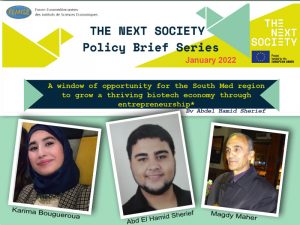 Micro, small and medium enterprises (MSMEs) constitute about 95% of total enterprises in the South Med region and are considered the driving forces of economic growth, job creation and green and inclusive growth. Entrepreneurs, particularity start-ups, still face numerous challenges when it comes to establishing, promoting and running their businesses. Providing them with support through innovative initiatives and enhancing the ecosystem where they operate will contribute to their development. In their turn, entrepreneurs will contribute to achieving several of the Sustainable Development Goals (SDGs).
Micro, small and medium enterprises (MSMEs) constitute about 95% of total enterprises in the South Med region and are considered the driving forces of economic growth, job creation and green and inclusive growth. Entrepreneurs, particularity start-ups, still face numerous challenges when it comes to establishing, promoting and running their businesses. Providing them with support through innovative initiatives and enhancing the ecosystem where they operate will contribute to their development. In their turn, entrepreneurs will contribute to achieving several of the Sustainable Development Goals (SDGs).
It is in this context that the Next Society (TNS) project and FEMISE decided to launch this initiative to produce “The Next Society Policy Briefs Series”. This series of briefs aims to better understand the challenges faced by entrepreneurs (through the lens of the entrepreneurs themselves) and to provide tailor-made operational policy recommendations. These briefs are based on collaborative work and exchange of knowledge and experience between the researcher(s)/author(s) and the entrepreneur(s), many of which have benefited from TNS project, ensuring their relevance and impact.
The eighth TNS/ FEMISE Policy Brief, entitled ” A window of opportunity for the South Med region to grow a thriving biotech economy through entrepreneurship“, by Abd El Hamid Sherief, American University in Cairo (AUC), is available here
 Summary:
Summary:
South-Mediterranean countries are in need of increased economic diversification as a way to create jobs and increase resilience to the volatile global economy. One path towards such diversification is to enhance the entrepreneurial potential in STEM fields (science, technology, engineering and mathematics) like green and blue biotechnology and their water-energy-food applications. Globally, agricultural biotechnology (technologies used to modify living organisms: plants, animals, and microorganisms), was valuated at 50.05 billion USD in 2019 with expectations of reaching 72.2 billion USD in 2024. Also, blue biotechnology (biotech applications related to marine ecology and resources) within the European Union (EU) region has witnessed investments of 336 million Euros in the period between 2014 and 2020 and as South Mediterranean countries enjoy a substantial coastal line; similar economic potential can be harnessed. These two subcategories of biotechnologies can potentially provide economic opportunities to South-Mediterranean countries especially if circular economy entrepreneurship was encouraged and administrative procedures were streamlined.
This policy brief aims to show how the biotech sector, in its waste valorization and bio-blue economy aspects, could thrive in the South-Med region if supported with appropriate policies that are science-informed and empowering to entrepreneurial innovation allowing for a more enabling startup ecosystem. The brief shows that while global competition may affect the ability of South Mediterranean countries to pursue ambitious biotech industrialisation in highly technical medical fields, agricultural biotech and blue bio-economy entrepreneurship could be easier to scale up; especially with rising global interest in regenerative / low impact water-energy-food nexus solutions and carbon fixation. The brief provides insights of concern to policy makers, based on the entrepreneurial experiences of three early-stage blue and agri- biotech startups. Academic-industrial integration, administrative reform and synergetic links with the emerging IT industry in South-Med region, are highlighted, among other parameters, as policies in need of implementation. In addition, harnessing the power of North-South and regional collaboration and the drive towards environmentally friendly businesses, could help encourage the emergence of more bio-entrepreneurs in South-Med countries.
Watch this video by the author of the Brief and the entrepreneurs who are sharing their experiences, highlighting the challenges and providing recommendations and lessons learnt.
*This Policy Brief and this Video are produced as part of the series of TNS/FEMISE Policy Briefs on “Entrepreneurship in South Mediterranean Countries” that is undertaken in partnership between FEMISE and ANIMA Investment Network.
![]() *”This policy brief and this Video have been produced with the financial support of the European Union. The contents of these products are the sole responsibility of the authors and entreprenerus and can under no circumstances be regarded as reflecting the position of the European Union.”
*”This policy brief and this Video have been produced with the financial support of the European Union. The contents of these products are the sole responsibility of the authors and entreprenerus and can under no circumstances be regarded as reflecting the position of the European Union.”


